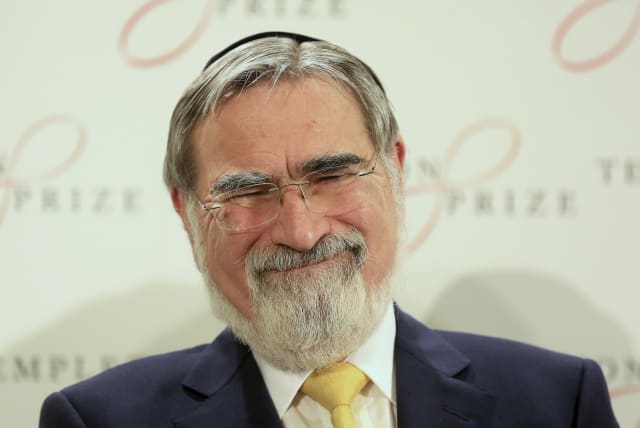Sacks scholars seek to preserve former British chief rabbi’s legacy

As the chief executive of the Spanish and Portuguese Sephardic Community in London, Rachel Fink was one of the 26 former students and close friends of the late rabbi participating in the conference.
Rachel Fink first thought she was an unlikely choice to be included in the first cohort of 26 Sacks scholars that gathered in Jerusalem this week.
“In all honesty, I first sat here thinking why am I here?,” she told The Jerusalem Post on Tuesday night at the opening event of the week-long conference to honor the life and legacy of former British Chief Rabbi Jonathan Sacks.“Maybe, what I bring is experience in the reality of things. I have experience working with communities in the real world, and I think that I can use that to help sustain the teachings of Rabbi Sacks,” said Fink.
As the chief executive of the Spanish and Portuguese Sephardic Community in London, Fink was one of the 26 former students and close friends of the late rabbi participating in the conference.
“Rabbi Sacks shared his teachings with many people, but they didn’t all know each other,” Rabbi Jeremy Bruce, one of the program directors, told the Post. “We felt that the best way to keep his thinking, his memory alive was to bring a cohort of those people together. And that’s how the program was born.”
Who was Rabbi Sacks?
Rabbi Lord Sacks, who passed away in November 2020, served as the Chief Rabbi of the United Hebrew Congregations of the Commonwealth from 1991 to 2013, and was considered one of the world’s most prominent religious figures. Known for spreading ideas of interfaith inclusivity and being a respected moral voice, he authored over 40 books and was knighted by the late Queen Elizabeth in 2005.
“Rabbi Sacks’ thoughts and leadership far transcend his immediate community and had a global impact,” Rabbi Sacks Legacy Chief Executive Joanna Benarroch said. “We brought together his students to discuss how to continue to share his wisdom with people around the world.”
The cohort consists of 18 men and 8 women, and participants hail from the US, Israel, Australia, Canada, the UK and South Africa. As part of their duties as “Sacks scholars,” each member of the cohort is responsible for coming up with a project to promote a teaching or idea of Rabbi Sacks. Among the different scholars, some are considering writing a book, creating an educational curriculum, or starting a new community program.
At the start of the ceremony, the Sacks scholars sat in a circle as a program leader facilitated a few interactive activities designed for the cohort to meet each other. “Some people here are already familiar with everybody, but there are also people that really don’t know anyone,” one participant remarked. The highlight of this portion of the night was a game called “Sacks or ChatGPT,” where the leader read off a series of quotes and the group had to decide if they were the words of Rabbi Sacks or written by ChatGPT.
Rabbi Gideon Sylvester, the British United Synagogue’s Israel Rabbi, kicked off the dinner portion of the evening with a d’var torah (word of torah) where he praised Sacks as “one of the few thinkers with the ability to balance the tent and the dwelling place.” According to Rav Kook, as told by Sylvester, the tent – a temporary, portable shelter – represents the wandering, dynamic part of the mind, while the dwelling place – a more permanent base – is a metaphor for one’s more rigid, core values.
“Let us all imitate Rabbi Sacks by always looking to create, mold, and develop our ideas while staying loyal to the source of our values,” he said.
Also in attendance were Sacks’ wife and brother, Lady Elaine Sacks and Alan Sacks, who was one of five speakers in a panel discussion called “The Man Behind the Yellow Tie,” in which panelists took turns sharing a specific middah, a jewish virtue, that they believed Rabbi Sacks embodied.
The ceremony culminated in the 26 scholars breaking out into four different learning sessions moderated by Bruce and other program leaders. Throughout the dinner, participants discussed what they hope to bring to the cohost, their experiences with Rabbi Sacks, and the impact they’d like to have.
Fink, discussing specific impacts she wants to make as part of her new role, mentioned that she’d like to further enable the voice of women in studying Torah.
Over the course of the conference, the scholars will engage in a series of different Jewish discussion sessions, ranging from practical applications such as “Becoming a Sacks Scholar,” to more abstract topics such as “Judaism, Humanity and the Cosmos: Moral Philosophical and Technical Challenges,” led by former Israeli Knesset members Michal Cotler-Wunsh and Tehila Friedman, among others.
Other programming includes a private conversation and concert, “The Spirituality of Song,” led by Ishay Ribo and Sivan Rahav Meir, and an in-depth exploration of the Judicial Reform controversy by Times of Israel political analyst Haviv Rettig Gur.
Daniel Taub, who served as Israel’s ambassador to the UK from 2011 to 2015, shared his hopes for the cohort while moderating the panel discussion.
“With everything going on in the world today, we often find ourselves asking: what would Rabbi Sacks say? That is the calling of this group – to try as best as we can to fill that gap.”
Jerusalem Post Store
`; document.getElementById("linkPremium").innerHTML = cont; var divWithLink = document.getElementById("premium-link"); if (divWithLink !== null && divWithLink !== 'undefined') { divWithLink.style.border = "solid 1px #cb0f3e"; divWithLink.style.textAlign = "center"; divWithLink.style.marginBottom = "15px"; divWithLink.style.marginTop = "15px"; divWithLink.style.width = "100%"; divWithLink.style.backgroundColor = "#122952"; divWithLink.style.color = "#ffffff"; divWithLink.style.lineHeight = "1.5"; } } (function (v, i) { });

